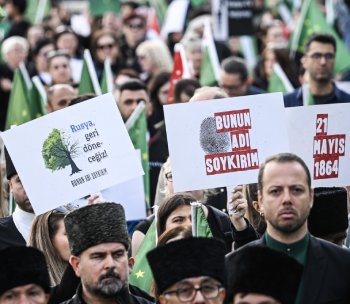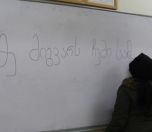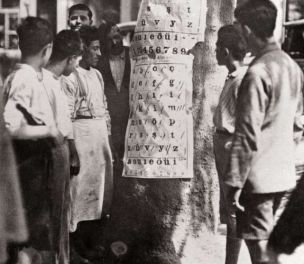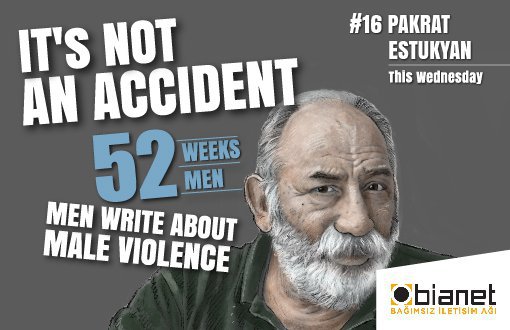Photo: Armenian inscription / Agos
Click to read the article in Turkish
It is not possible when exactly humans transformed the sounds they make into words as a tool for communication in the prehistorical periods. Myths on history tell that those working in the construction of the Tower of Babel started speaking different languages being god-curst and that it was therefore that the construction of the tower could not be completed.
This mythological story tells us that different languages were shaped in the region we live in. However, there are many contradictions in this story, just like in many religious and mythological stories. From the natives of North America to the peoples of the Amazon forests and the African and Australian tribes, and the East and South Asia lowlands and the Pacific islands, people of many different races succeeded in turning natural sounds with different characteristics into a communication too, thus a language. But the myth of history attributes this phenomenon to the construction of the Babel Tower and therefore becomes invalid from the very start.
The emergence of culture
Language, as a common communication tool for transferring knowledge and experience, represents, beyond doubt a significant stage in development. The second stage in the creation of culture as we know it today was the discovery of writing. The writing again took place first in the region where we live, approximately four thousand years ago. Sumerians developed the alphabet which we define as the cuneiform script by making notches on tablets.
These tablets reached today because they were cooked in special furnaces after being written on. Modern archeology decoded these signs and acquired very valuable information for us concerning the trade activities, diplomacy, justice, government, and daily life of thousands of years before.
After the cuneiform script of the Sumerians, this time hieroglyphic was discovered written on papyrus with completely different means, and thus the writing characters defining the goods or phenomenon that are expressed were developed.
Archeologists were successful in reading them also and they made the mysteries of the ancient Egyptian civilization known to us.
Alphabet languages prefer
There are thousands of languages spoken on the globe but there are only 28 alphabets, which is quite interesting. While there are Latin, Cyrillic, Greek, and Arabic alphabets that many different people use to write their mother languages, there are also some used to express only one language.
Hebrew, Georgian, Armenian, and Assyrian alphabets can be cited in this group. Even if these alphabets were used to record different languages in the past, today their use is restricted to a single language. For instance, we know that there is an entire corpus made up of texts in Turkish and Kurdish written in the Armenian alphabet. These contain many literature works besides periodical publications such as newspapers and magazines. The same can be said about the Greek alphabet.
Especially the Ortadox Karamanids were using the Greek alphabet for writing. Just as the Kypchak Turks used the Armenian alphabet and the Gagauzians the Cyrillic or the Latin alphabet.
Political orientation can also determine the alphabet preferred to write down a language besides sociocultural factors. After the announcement of the Republic, the "pure Turkish" cleared of the Arabic and Persian words, should be written with the Latin alphabet instead of the Arabic one, different from Ottoman Turkish. This was an ideological obligation while it was argued that learning the Arabic alphabet was difficult, explaining the low literacy rate with this difficulty. But in fact, the low level of literacy was not due to the difficulty of learning the alphabet but due to rejecting education as a whole. Today the literacy rate in neighboring countries such as Iraq and Syria is still higher than that of Türkiye.
Transformation by itself
When the Republic of Armenia took part in the Soviet Union in 1920, the political authority campaigned strongly for the Cyrilian alphabet to be adopted instead of the traditional Armenian alphabet, but was not successful. Azerbaijan also left the Cyrillian alphabet and adopted the Latin alphabet after the Soviet Union. When the Republic of Türkiye left behind the Arabic letters, it was turning its back completely to the Arabic culture and facing towards the West. Azerbaijan too wanted to distance itself from the Russian culture by giving up the Cyrillian alphabet.
Today such transformations happen by themselves rather than by ideological or political imposition, in relation to technological factors.
Especially with mobile phones in our lives, many Armenian users started to prefer the Latin alphabet for messages rather than the Armenian alphabet. In fact, almost all phones have Armenian characters. However, users prefer the Latin alphabet on Twitter or Facebook or when sending messages. We even see that some new letters are being added to the Latin alphabet for sounds that are used widely in Armenian but do not have a corresponding letter in the alphabet, such as the '@' sign.
Languicide
Many languages were born where we live. Therefore it is only natural that the same region is the graveyard of many languages. What is not natural is that while the births happened down the ages, the deaths take place in a much shorter period of time. It is therefore that we should add to the criminal record of our country the concept of "linguicide."
The most important victims of this linguicide are the Circassian languages such as the Ubykh, Adige, and Kabardin dialects, and the Laz language, Georgian, and the Pomak language. We can say that what lies behind the fact that these languages are not spoken in Türkiye is the need to be protected from possible discrimination.
The bans and the oppression which were first implemented in order for a single language, Turkish to be dominant turned into voluntary assimilation a while later. People have similarly waived using original names and preferred to merge into the dominant society.
The demand for the right to education in the mother language, raised today by the Kurdish movement, which is an outcome of their nationalization process, is being defined as being divisive by these societies who choose voluntary assimilation. We almost see a situation that is the answer to the question, "How can we create minds yielding to the system the best way?" The viewpoints of people who see their original culture, mother tongue, traditions, and therefore the cultural values inherited from ancestors as a threat, first of all, prove the victory of the ideology that shaped the foundation of the Republic.
Two choices
The mosaic of the peoples was broken up in the 1915-1923 period. The Law on Unification of Education and the campaign "Citizen, speak Turkish" killed the mosaic of languages. And now we are witnessing the vaporization of cultural diversity with religious-sect fanaticism.
The founding philosophy of the Republic the 100th anniversary of which we are preparing to celebrate was based on the idea of Turkish enlightenment to advance on the road to modernization, cleared of Arabic, Persian, and Islamic elements totally. And we are now preparing to meet the second century of the same Republic with a mentality based on radical Islamism that cleared up all diversity it includes.
Maybe this will be our share of the doctrine of the clash of civilizations in the neo-liberal global despotism era. We will either take the last exit before the bridge or drive our vehicle to the bridge which is broken just in the middle of it.
With the first choice, we have the chance to visit the graveyards of languages each February 21 with a bundle of carnations in our hands. With the second one, we will be waiting in the same graveyard for visitors to come with flowers in their hands. (PE/AÖ/PE)
One century, one regime, and the right to mother tongue





.jpg)



.jpg)
sasa.jpg)

